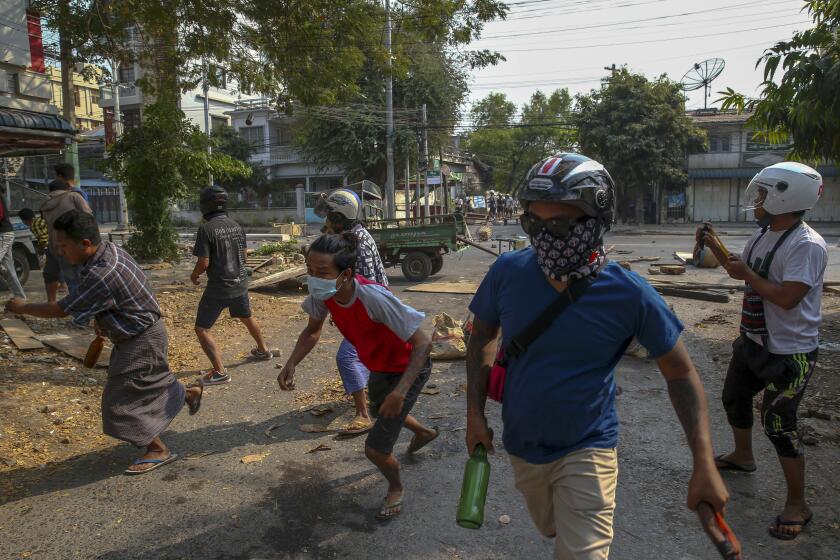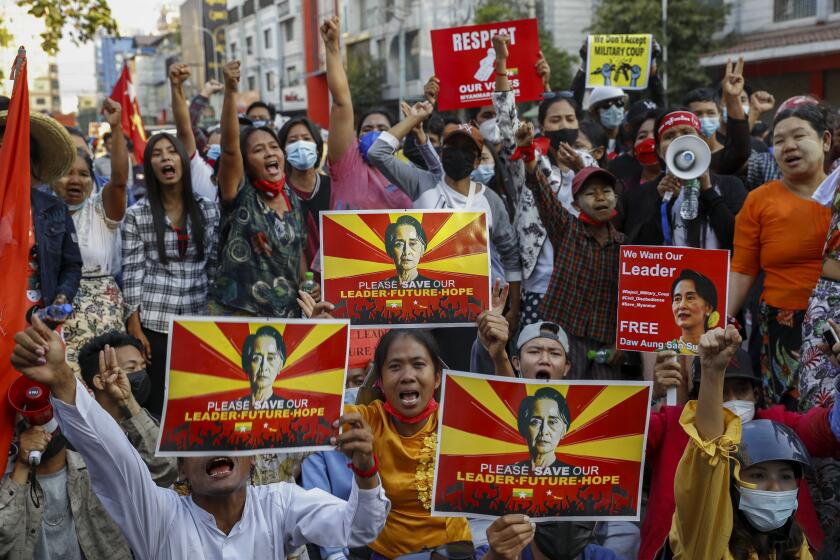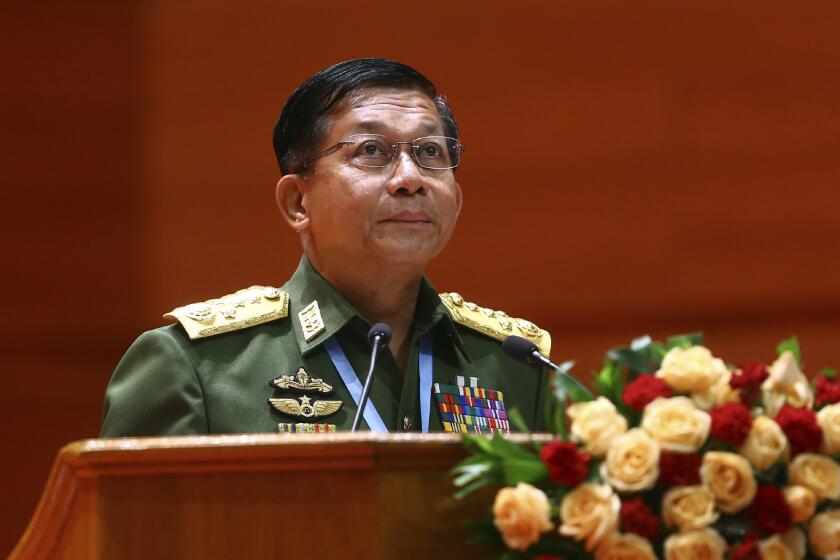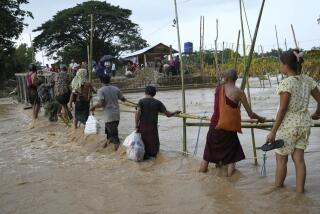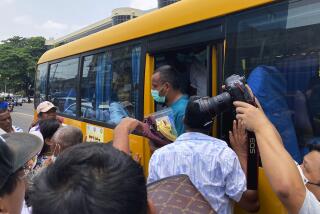Myanmar security forces kill at least 34 protesters, reports say
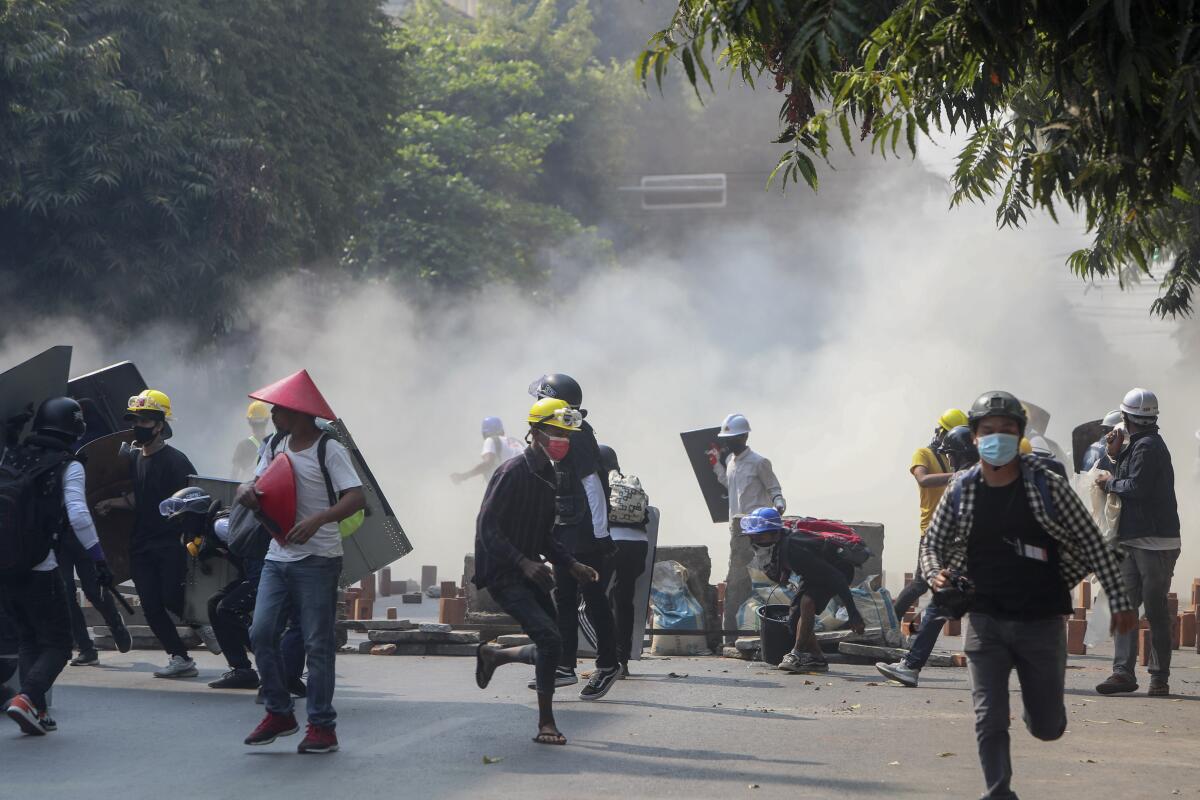
YANGON, Myanmar — Myanmar security forces dramatically escalated their crackdown on protests against last month’s coup, killing at least 34 demonstrators Wednesday in several cities, according to accounts on social media and local news reports compiled by a data analyst.
That is the highest daily death toll since the Feb. 1 takeover, surpassing the 18 that the United Nations’ human rights office said were killed on Sunday, and could galvanize the international community, which has responded fitfully so far to the violence. Videos from Wednesday also showed security forces firing slingshots at demonstrators, chasing them down and even brutally beating an ambulance crew.
The toll could even be higher; the Democratic Voice of Burma, an independent television and online news service, tallied 38 deaths.
Demonstrators have regularly flooded the streets of cities across the country since the military seized power and ousted the elected government of leader Aung San Suu Kyi. Their numbers have remained high even as security forces have repeatedly fired tear gas, rubber bullets and live rounds to disperse the crowds and arrested protesters en masse.
The intensifying standoff is unfortunately familiar in a country with a long history of peaceful resistance to military rule and brutal crackdowns. The coup reversed years of slow progress toward democracy in the Southeast Asian nation after five decades of military rule.
The Wednesday death toll was compiled by a data analyst who spoke on condition of anonymity because he feared for his safety. He also collected information where he could on the victims’ names, ages, hometowns, and where and how they were killed.
The Associated Press was unable to independently confirm most of the reported deaths, but several square with online postings. The data analyst, who is in Yangon, the country’s biggest city, said he collected the information to honor those who were killed for their heroic resistance.
According to his list, the highest number of deaths was in Yangon, where the total was 18. In the central city of Monywa, which has turned out huge crowds, eight deaths were reported. Three deaths were reported in Mandalay, the country’s second-biggest city, and two in Salin, a town in Magwe region. Mawlamyine, in the country’s southeast, and the central city of Myingyan and the town of Kalay in the west each had one death.
As part of the crackdown, security forces have also arrested hundreds of people, including journalists. On Saturday, at least eight journalists, including Thein Zaw of the Associated Press, were detained. A video showed he had moved out of the way as police charged down a street at protesters, but then was seized by police officers, who handcuffed him and held him briefly in a chokehold before marching him away.
He has been charged with violating a public safety law that could see him imprisoned for up to three years.
Demonstrators in Myanmar take to the streets again to protest last month’s military coup despite the new regime’s use of violence to quell them.
The escalation of the crackdown has led to increased diplomatic efforts to resolve Myanmar’s political crisis, but there appear to be few viable options. It’s not yet clear if Wednesday’s soaring death toll could change the dynamic.
The U.N. Security Council is expected to hold a closed meeting on the situation Friday, council diplomats said, speaking on condition of anonymity because they were not authorized to make the information public before the official announcement. Britain requested the meeting, they said.
Still, any kind of coordinated action at the U.N. will be difficult since two permanent members of the Security Council, China and Russia, would almost certainly veto it. Some countries have imposed or are considering imposing their own sanctions.
Staged car breakdowns, blocked railway tracks and civil servant strikes are putting pressure on the junta and raising fears of a harsh crackdown.
On Wednesday, the U.N. special envoy for Myanmar, Christine Schraner Burgener, who supports sanctions, told reporters at the world body’s headquarters in New York that she receives about 2,000 messages a day from people inside Myanmar, many “who are really desperate to see action from the international community.”
The Assn. of Southeast Asian Nations, of which Myanmar is a member, held a teleconference meeting of foreign ministers Tuesday to discuss the crisis. But there too action is unlikely. The regional group of 10 nations has a tradition of noninterference in one another’s internal affairs. A statement by the chair after the meeting merely called for an end to violence and for talks on how to reach a peaceful settlement.
Myanmar’s military already held vast economic and political power. Now it has to govern a country grappling with health and economic crises.
Ignoring that appeal, Myanmar’s security forces on Wednesday continued to attack peaceful protesters.
In addition to the deaths, there have been reports of other violence. In Yangon, a widely circulated video taken from a security camera showed police in the city brutally beating members of an ambulance crew — apparently after they were arrested. Police can be seen kicking the three crew members and thrashing them with rifle butts.
Security forces are believed to single out medical workers for arrest and mistreatment because members of the medical profession launched the country’s civil disobedience movement to resist the junta.
Breaking News
Get breaking news, investigations, analysis and more signature journalism from the Los Angeles Times in your inbox.
You may occasionally receive promotional content from the Los Angeles Times.
In Mandalay, riot police, backed by soldiers, broke up a rally and chased about 1,000 teachers and students from a street with tear gas as gunshots were heard.
Video from the Associated Press showed a squad of police firing slingshots in the apparent direction of demonstrators as they dispersed.
More to Read
Sign up for Essential California
The most important California stories and recommendations in your inbox every morning.
You may occasionally receive promotional content from the Los Angeles Times.
